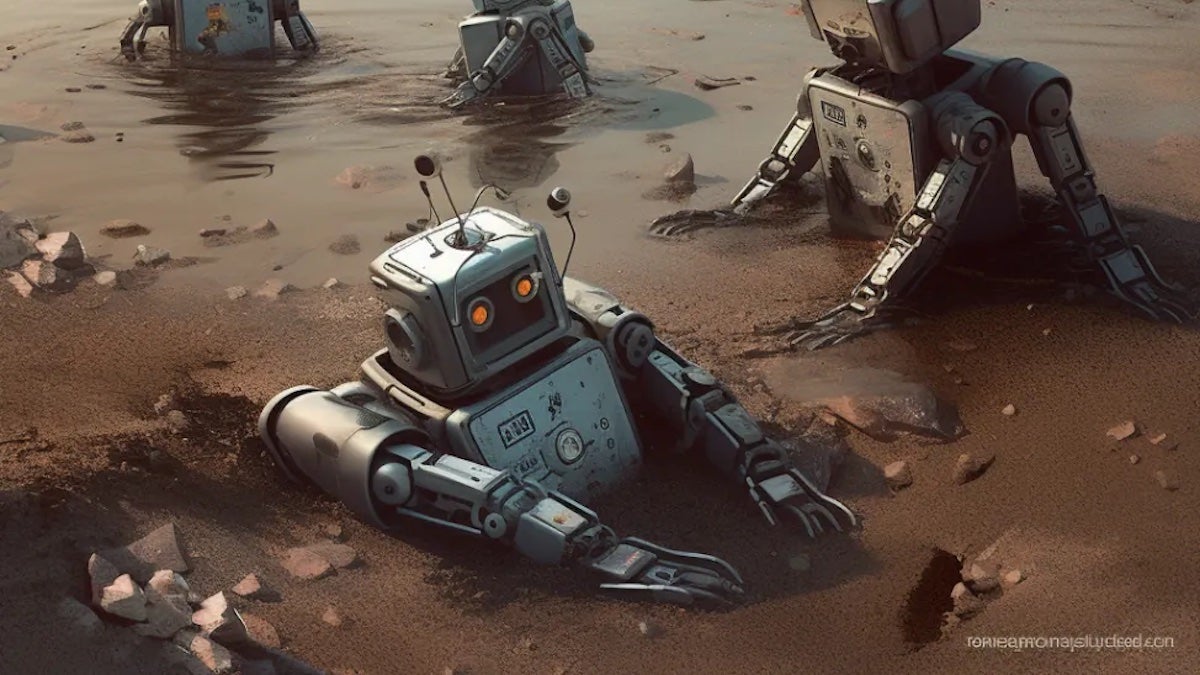- cross-posted to:
- technology
- cross-posted to:
- technology
Seventy-seven percent of middle-age Americans (35-54 years old) say they want to return to a time before society was “plugged in,” meaning a time before there was widespread internet and cell phone usage. As told by a new Harris Poll (via Fast Company), 63% of younger folks (18-34 years old) were also keen on returning to a pre-plugged-in world, despite that being a world they largely never had a chance to occupy.
I call BS. I think this is something that people like to think that they believe, but they really don’t.
The first time they found themselves standing in the kitchen and thinking, “How long am I supposed to cook chicken?” and realizing the only way to find out is to clean up, get dressed, drive down to the bookstore and find a cooking-for-beginners book (or, if they’re lucky and know somebody who would know the answer, they could try to call them, but it would only work if that person was home and able to hear their landline and felt like gambling on answering an unknown call - unless they maybe had caller ID), they’ll be right back on board with the digital age.
Like, go watch early-seasons episodes of The X-Files and realize how many of the plot lines only work because the show started in a time that was pre-mobile phones, and then realize that kind of hilariously stupid and inconvenient situation was just, like, everyday life for everybody not so very long ago. Plan to meet a friend for lunch but they don’t show up? You can decide to wait and risk eating alone, or go home, because there’s literally no way to find out if they’re just running a little late or if they’re completely unable to come or what.
Sure, social media is a bit of a hellscape, but there is so much convenience that people take for granted that comes from cell phones and internet. I just do not believe more than a single-digit percentage of people would seriously enjoy going back for more than a few days, tops. No more than a camping trip.
Did you mean ride their bike to the library? Yeah. You’re right on the money.
Also cars were much less reliable back then. Nothing like breaking down again and walking to a payphone… and that’s just the beginning.Perhaps the key is keeping off of social media when you are recognizing it is making you feel bad. I really started having a negative experience with the facebook/Instagram stuff, but I have also found that more text based stuff that is discussion oriented doest make me feel bad. It does seem that the spulsucking stuff is key to making a platform profitable though. Oh well… I guess I will just have to keep using non profitable platforms.
I have trying to find the poll by following link and found nothing but this.
According to a new Harris Poll shared exclusively with Fast Company
So there is no actual source, no ways to check if the poll actually exist or not, no way to check if poll’s question phrased in a way to get certain response, how many actually responded to the poll, etc. And, compare to most big news published poll result, a confidence and margin of error.
There for, I simply view this as click bait article to generate engagement, which it did.
I too would be interested in the poll methodology and results - if there was such a poll. The Harris Poll website (https://theharrispoll.com/partners/media/fast-company/ ) doesn’t show any such poll - at least not that I could find after scrolling through pages and pages of polls and then keying ‘middle-aged americans’ into the search bar.
Well, as we all know, 73% statistics are made up on the spot
I think the % is much higher cause even I sometimes say stuff like “I believe like 80% of my post is about games”. But the reality is that I never actually tried to count it.
It’s exactly counter to established research that places huge values on internet enables services.
https://mitsloan.mit.edu/ideas-made-to-matter/how-much-are-search-engines-worth-to-you
18k per year valued for search engines, 9k a year for email and 4K a year for maps.
Of course framing might be slightly different, but getting people to saying thing is very different than getting people to put money where their mouth is. I would much rather trust the dollar signal, especially in the US.
I bet this is more about the stress of being constantly available to your boss, your parents, your teachers, your neediest friends than about wanting a world without technology.
I think you’re right on the money, I recently took a vacation and i had the luxury to turn everything off I wanted and truly enjoy it, most Americans can’t do that.
Euros don’t have to deal with that shit because they are smart enough to organize enough to end that crap.
I think it’s both that and not having real community ties. We don’t form close associations with each other like back when we had town events, neighborhood gatherings, people belonged to more clubs, recreational groups, labor unions, etc.
I wonder if there was an attempt to ask people about television, too.
True. Though we’re blaming the wrong thing in that case, we don’t have town events and neighborhood gatherings because local communities don’t have the money or a set town space anymore since the public square has been corporatized over the last few decades. Everything’s been monetized, loitering laws have criminalized just hanging out. Real life has the same problem the internet has.
Agreed. I think it’s more that we have been fooled on a superficial level into thinking that online interactions have filled the void (we’re on “social media” after all). So we still recognize that there’s something profound missing from our lives, but what that thing actually is has become kind of obfuscated. The dilemma then becomes whether to 1. blame technology, or 2. blame ourselves individually (“there must just be something wrong with me”). And either way it leads away from the radical solution of rebuilding those local, deep connections with our communities.
If you are longing for a world that you never lived in, there’s probably some “grass is greener on the other side” in play. The world before smart phones was considerably worse. I bet that most of the people who are asking for this don’t know how to read a paper map and have never seen a phone book.
The good news is that, if you don’t want to use a smart phone, you can just… not. Nobody is forcing you. If you really wanted a world without smart phones you would already not be using one!
That’s not entirely true. I have twice in the last year had no other option than to install an app to use tickets I purchased. An many medical services refuse to do anything that isn’t online or via an app. It’s getting to be harder and harder to not need a mobile device. It’s getting pretty stupid. Theine has been crossed already. I lived half my life without internet, I’d survive without it. But the world isn’t headed in a direction that makes it feesible anymore unless you just completely check out.
A lot of banks here around me are closing cause they want people to use the online banking only, customer service barely existed in a long time now already anyway, but specifically for the TAN you need an app and thus smartphone. Not an issue for me personally as I‘m tied to all this through my job anyway, but for old people and technologically illiterate people it must feel pretty dystopian.
If you are longing for a world that you never lived in
Middle aged Americans definitely remember a time before everyone was online all the time. It’s not dreaming of some hypothetical unknown Camelot, it’s remembering a time when people actually showed up for their dinner plans with you because they couldn’t simply text to flake out when you were already seated.
It’s also a time where people didn’t show for the dinner plan and you waited for them for 30 minutes before giving up and heading back home without knowing if they forgot, died in an accident on the way or decided to stand you up.
Yep. We remember breaking down in shitty unreliable cars, then walking to a payphone and putting up with whatever shit repair place was available. We remember it well.
Nobody is forcing you.
That is not really true, I mean depending on your definition of “forcing”. Okay, it’s true, nobody is holding a gun to your head.
But depending on where you live, it may be impossible to use a taxi. It would be impossible to work at a lot of workplaces. I work at a university where thankfully faculty are not required to own a smartphone, but students are (if you do not check in for attendance with the university’s app, you automatically fail the course). Soon here it might be impossible to have a bank account without a smartphone app. Any event that requires tickets, forget about it. We’re also getting closer to it being a requirement to see a doctor (some doctor’s offices here already do not allow any patients that haven’t installed their app, and the number is growing).
There’s a lot of soft pressure, too. The supermarket by us doesn’t require you to install their app. You can pay cash without a smartphone…if you’re willing to pay 2x the usual amount for groceries (which are already quite expensive).
I work at a university where thankfully faculty are not required to own a smartphone, but students are (if you do not check in for attendance with the university’s app, you automatically fail the course)
You could always not work/attend that school
undefined> if you do not check in for attendance with the university’s app, you automatically fail the course
That is completely fucked. I would refuse out of principle and demand an alternative based on my creed/religion. Linux is a religion, right?
I found your comment posting at the same time as mine with the same thesis (complete with “can just …”) pretty funny.
Do people really want to go back to the dark ages before Wikipedia existed? I know I don’t. Knowledge is power, and the Internet is a treasure trove of it, if you know where to look.
That said, I do want to go back to computers that obeyed only their users and no one else. Malicious hardware like TPM and Pluton is really scary.
I interpret this as really “people want to go back to a time before income inequality had ramped up as much as it has” but in their minds the overall feeling that the US is worse now for the non-elites is associated with other things
I think this is a part of it. Also, sprinkle in a good amount of wanting to go back to being younger.
But yeah, the golden era of the internet (whichever you deem that to be) felt way less fucky than what we’re dealing with now.
The people who think this apparently think the middle class lived differently than they actually did in the 1970s. I am solidly poor and lower class and I live better than middle class people did then.
Servers and service workers weren’t saving up and flying to Europe or South America back then.
And while poverty has increased and the middle class has shrunk, that isn’t necessarily because of income inequality. They are two different things. There is not a set amount of money or wealth that is divided up.Servers and service workers weren’t saving up and flying to Europe or South America back then.
They still aren’t. They’re barely keeping roofs over their heads, let alone taking expensive vacations.
And while poverty has increased and the middle class has shrunk, that isn’t necessarily because of income inequality.
I can’t think of any other plausible explanation.
I worked as a server and in coffee shops and yes, they most certainly are. Not all, but plenty. People generally fly to other countries much, much more than they used to. It’s not just the wealthy any more, at all.
undefined> I can’t think of any other plausible explanation.
Housing is scarce and much more expensive for starters. Middle class people like using housing as an investment and vote to keep housing scarce because of that. It’s not just the .1% that are voting for those policies.
China has a whole lot more income inequality too but much less poverty and a much larger middle class than before. The world as a whole does. Those two dynamics are not that related. Income inequality can grow whether the middle class is growing or not and can grow or decline whether there are more people in poverty or less.
As much as I share your centiment about tech. I don’t quite realize how is TPM scary? It physically separates security-critical operation from the main CPU.
It doesn’t obey the user. There is no way for the user to examine the keys stored in it. The entire concept of remote attestation is disobedient to the user. And so on.
The people who do don’t do research or use the internet to learn about stuff. Or just do “research” on Youtube/social media.
I don’t think people actually would, if push came to shove. They’re just expressing nostalgia for a simpler time, which is pretty easy to understand, given all the dystopian effects of social media and smartphones.
I think smartphones have done a lot of harm, but they’ve still done far more good, which is why we use them. Especially in poorer countries where smartphones are often people’s only access to the internet.
That said, there’s nothing stopping any of these people in the article from being the change they want to see in the world. Not to send anybody to Reddit, but r/dumbphones is a fast growing subreddit for people that want to try that. A lot of the users are Gen Z who never got to try them and want to give it a whirl.
Yeah, I think people forgot how terrible it was before email, gps, and etc.
Remember having to find the yellow book to call a plumber only to not get anything after trying 5 numbers? Oh wait, you don’t know how bad they’ll be because there are no online reviews. Memos from your boss via sticky notes? Faxing shit over and over again?
I mean, this study says it all, people need to be paid almost 20k to not use any online search for a year, almost 9k to not use email in a year. These services provide huge value for us in our daily lives. https://mitsloan.mit.edu/ideas-made-to-matter/how-much-are-search-engines-worth-to-you
It wasn’t that terrible but it was definitely slower. Some things for sure sucked. Now totally different things suck.
This seems like a sensible take on the subject.
This is a chicken and egg problem, today’s Web is so horrible exactly because most of the boors in it treat it with disgust from the very first moment and try to avoid choices, thus make the worst choices possible.
I mean, it’s a golden rule - if you don’t know what to do, do something. They don’t out of fear, just consume what they are being given, which is the very thing they should fear.
This is also pretty common. People tend to think like that about everything they had in their formative years.
It’s nostalgia plus a realization of how entrenched tech bureocratic processes have penetrated their lives, oftentimes making them worse, not better (many of the improvements are taken for granted).
But my point is you can take this “old times were better” in most of every case when doing these surveys. About music, TV and everything.
What people really want are the benefits without some of the cons that they’ve very willingly accepted out of laziness and/or ignorance.
They’ve lost a ton of privacy and rights and ability to discourse and act by being so heavily surveilled and “panopticon’d” into superficial uniformity of opinion.
Many of the things they complain about they can still do “non tech/non online” but it requires more effort than pretending that there should be just one way so they don’t have to choose.
I feel like, for the 35-54 bracket at least, this must be less about giving up all the modern conveniences we have today but more about wishing they could raise their children in that simpler time. You don’t want your kids to be left out of what’s new and cool but you also don’t want them exposed to EVERYTHING these platforms bring. It’s a tight rope to walk and I’m not looking forward to it when my kids are older. I know a lot of people who have gone down the road of, “I didn’t have a cell phone growing up, my kids won’t either.” But it’s not very realistic in today’s world.
I agree with your assessment. I have a lot to say about this, and I’m glad to have found this article, as I’ve been having some serious inner turmoil about this lately, and this makes me feel a bit like I’m not totally alone or crazy. (But also I can’t find a link to the original survey, which makes it hard to trust, as I can’t find any description of the methodology or the exact wording of the questions)
I’m an older Millenial (sometimes consider Gen X, depending on the terminology used) with young kids. It’s true that I would rather have them brought up 30 years ago than today. Sometimes when I see posts about parents letting their young kids (like let’s say 10) have their own smartphone and then complain about, people get snarky like “You’re the parent. If you don’t like it, just take their smartphone away.”
But it is a tightrope to walk. I don’t want them expose them something like Instagram, which gives them eating disorders, depression, anxiety, chips away at their sense of privacy, etc. But I also don’t want them to be “the weird kid” who can’t relate to any of their peers. When I was growing up, I remember "the weird kid"s who weren’t allowed to watch TV, weren’t to play video games, etc. I can recognize that in many ways they probably benefited from not sitting in front of the TV for hours each day, but I can also recognize they probably didn’t benefit from not being able to talk to any of the rest of us about the latest episode of Fresh Prince. I do see it as a balancing act between teaching them that there’s a lot about their generation that sucks, but also letting them experience enough of it to see for themselves, and relate to the other kids around them.
What are you thinking you’ll do? How are you planning to strike the balance?
I don’t have kids and I’m not sure I will, mostly because I have a lot of un answered questions. How I would handle raising them with technology is one. So I’m curious, if you don’t mind sharing.
It’s a big question and I don’t think I can give an answer that will cover everything. A lot of it will depend on what they want to do, too. As long as we can have a real discussion about things beforehand, I don’t think there are many technologies or services that I would flat-out ban.
I’ve realized lately that a lot of the problems I have with how society at large uses technology is it’s not deliberate/intentional or thoughtful. I think if you’re going to buy a smartphone, or download an app, and click “Accept” on all the permissions, you should at least have a goal in mind before you use it. What specifically are you intending to accomplish with it? If it’s to stay in touch with your friend, that’s fine, just have that goal in mind when you’re using it. If it’s to follow the goings-on of your favourite celebrity, okay, as long as that’s your intention. But I think too often, people buy something or download and install something just because of FOMO or without any idea or understanding of what it’s going to do. It puts you in a passive position of allowing a large tech company to decide your use and your experience for you, and that might not be what’s best for you. That kind of passive exploratory attitude I think worked well up until the introduction of “dark patterns”, but it’s a bit dangerous now.
The other major thing is I want is to introduce them to community-developed technology first. Before they get to the point where they have to decide if they want to install Instagram, I think they should have experienced the Fediverse first, that kind of thing. I think they should understand that there is still technology out there which is completely good (by which I mean free/open source software and community services are sometimes useless, sometimes buggy, sometimes lacking in features, sometimes cumbersome to use, but they’re never antagonistic or evil or deceptive). At the very least they should know all of what kind of technology is out there for them.
Ideally I would also like them to understand how things work. My oldest is 4 now and can read a little bit. Not complete sentences or even long words, but enough that I know it’s not going to be too many more months before she’s capable of reading properly, and maybe typing, and maybe even some programming. A fair amount of software depends upon ignorance (remember when SnapChat claimed your pictures/videos “disappeared”?) and I think understanding of technology can help navigate bullshit a lot easier. But, a lot of that will depend on her and what interests her…
I don’t want to go back to a world without the internet or cell phones, but I would like expectations to change. Just because you can theoretically reach me at any time doesn’t mean I’m obligated to respond to you or acknowledge you at any time. Whether it’s work or personal acquaintances, I can’t stand it when it’s treated like a horribly rude thing to not immediately acknowledge and respond to any communication, no matter how trivial. A lot of times, I’m busy working on my own thing and don’t want to kick off twenty minutes of back and forth texting over some trivial thing that’s going to distract me from what I’m doing.
Do people not realize they can just log off? Go watch TV, it’s still there. Turn off your phone, it has a power button. Read a book or go outside. None of the pre-internet options have gone away.
I mean, yes, that is true for your spare time. But with the way things are working now, everything has to happen immediately, you might feel you need to be available 24/7, even if you don’t technically.
Work in general is more fast-paced because of it (emails and phone calls over snail mail), everything you do is attached to your phone making it difficult to turn it off (banking, cards, travel apps, dating apps etc).
In the purest sense, yes, you can take breaks from it all, but it’s still there, and while I don’t think it’ll happen anytime soon, I do believe we’d benefit as a society from being less chronically online (I say writing this on an app for a federated social media site, but y’know, small steps).
That’s a discussion about working conditions. Europeans aren’t having to put up with being available after work hours. Sane workplaces in the US don’t do that either.
I think you misunderstood me, I didn’t talk about doing work in your spare time. I’m saying because of technology, when you’re at work everything is more fast-paced, which I think contributes to feeling more stressed in your spare time.
Couple that with everything important being attached to your device, including addicting apps like TikTok (for some, not me personally), and it can become a difficult habit to break, because you’re forced to still engage with your phone for various but important reasons.
Maybe I’m just lucky, but I’ve kept office hours for the totality of my career thus far, nearly 25 years. Most of my colleagues do as well. We all understand that we have lives outside of work, and that those lives take precedence. So long as we all get our shit done, nobody much cares about when you’re clocked in and when you’re not, outside of core hours (around 10 to 3 each day). If we want to turn off our phones, nobody much gives a shit so long as we’re back on the chat the next day.
Like I said to the other commenter, I think I must have been unclear, because I’m not even talking about working in your free time. I don’t believe I stated that in my original comment at all.
I’m just saying everything is so much more fast-paced now due to technology which I think in turn makes it more difficult to relax, plus you have to engage with your phone for important matters as everything important happens online, like the examples I mentioned, so even if you want to turn it off, you might feel like you cannot.
I don’t want to log off. I want everyone else to log off and to give me the small quirky Internet I used to love back.
Of course, I know this isn’t reasonable, but it’s generally my attitude towards the changes the Internet has undergone since I started using it.
I miss when the Internet was a novelty, most heavily used by tech enthusiasts, rather than a central part of everyone’s social lives.
I like the internet. It’s been integral in my life becoming myself. I’ve met some of my favorite people through it.
It’s my hope that the era of social media comes to an end and the internet transitions back to how it used to be pre 2008 or so (iPhone and Facebook changed things), less centralized and all-consuming. A return to smaller communities as opposed to these larger algorithmic, advertiser-servicing platforms. Discord servers and focused forums. Communities of friends over public places to chase clout. In addition to handy services like shopping, banking, maps, etc. In essence, the internet as a tool rather than a social expectation. Because in many ways it is a really powerful tool, and I don’t want to see that go away and I don’t think it ever will at this point.
There are cracks showing in the social media model, Twitter and reddit in particular at the moment, but it yet remains a hope that we can turn it back to a more positive thing in our lives.
Not to mention facebook the company (now meta) has been struggling too, losing ~75% of its market cap in the last few years… finally.
As someone who is Gen X or millennial depending upon the day and the years they pick, I don’t want this. It’s very easy to look back through rose-tinted glasses, but there are a lot of things, which many commenters already touched on, that were much harder or worse then. One that I didn’t see early was maps and navigation. I had to lug around a giant atlas and plan out my routes to get somewhere. If there were a new street or development or something, I was SOL. Even in the early days, printing out MapQuest maps was far better, but still had its own issues. Aside from that, many other commenters mention many of the things that were decidedly worse or more inconvenient back then.
Oof yeah even that awkward period where online maps were a thing but mobile internet wasn’t quite there yet (at least here in NZ) sucked, got a lot of “fond” memories of printing out gmaps screenshots in order to give my parents directions! Wasn’t quite as bad as traditional fold-out paper maps but still nowhere near as easy and convenient as it is nowadays.
If they are heart-shaped rose-tinted glasses then I’m in.
Seems reasonable to me. I’m in the upper end of that range, center GenX (yes I know you don’t remember us). I vary between wanting it to be 1970-2000. 1990 was nice, good industrial music, many of the old blues musicians were still alive & playing, computers were still fun, BBS’s, the early non-shitty Internet, pagers and car phones if you wanted to be reachable that much, but you could just NOT be. Go out for cigarettes and never come back.
Anyone who thinks this panopticon hellscape we live in is better, is nuts.
I can’t help but feel like a lot of the “the internet was better back in the day” is rose colored glasses. Things were just as fragmented, but were even less welcoming to our groups, there was more questionable content that people were trying to trick you into viewing. It definitely wasn’t all bad, but it feels like it’s coming from the same impulse as every other “things were better back in my day.”
A key difference is that nothing was being shoved at you as soon as you got up from the computer.
You can always put your phone down. I also get the pressure to return a text/dm right away, but as far as I can tell no one that I actually want to talk to expects that immediate response.
That was a key thing to finally learn. I’d removed all the people who expected I was on call for them from my life for other reasons, which wasn’t an easy process, so everyone left is a reasonable person who texts for non-business reasons with a 1-2 day response expectation, though it’s usually much faster. If it’s more important, it’s a phone call. If they just want to chat, they text to see if I’m available before calling.
I set my phone to not ring unless the number’s in my contacts. If someone needs to get a hold of me, they can leave a message … but never do. I get notifications for weather alerts, text messages, my transit app and when a new xkcd gets posted. I certainly check my email and other apps on occasion, but I don’t need notifications.
Other than surrounding yourself with the right people, the whole thing takes minutes once you’ve hit that mindset.
There was far less overt fraud in society. Ads required more investment and “truth in advertising” and political discourse was not as polarized. It did start in mid-80s, and was about 1/4 as bad by late '90s, but the Internet and esp. Facebook made it trivial to target and brainwash the weakest-minded part of society.
Used to be everyone had to get pop culture together, news from very bland centrists together, crazy uncles couldn’t find right-wing militia newsletters as easily.
If you were technically proficient (like me), BBS’s could be about anything, support any group, so marginalized groups weren’t completely isolated.
How much did a computer cost back then? How much were the first graphics cards? How compatible were computers with each other? How much did one album cost on CD? How easy was it to obtain information on a problem? How easy was it to price compare things between stores?
The issue is social media and allowing everyone to voice their immediate thoughts on things in pseudo anonymity. It’s also the tendency of people to look at people’s fake persona and then compare themselves to it. I could rent a Lambo for the weekend and use a filter like I’m actually fit and still have hair and make all my former classmates insecure because they never see me in person. That’s the shit everyone wants to go away, they don’t want to give up Spotify.
People forget, or just weren’t around, when only the rich had a mobile phone the size of waffle iron and it just made expensive calls. Even early cells had exorbitant rates for long distance conversations between states, so we had to wait until night when it was more affordable to talk. If I wanted to watch a specific movie, I needed a credit card with a $500 hold to rent a VHS player for 24 hours, and hope that Teenage Mutant Turtles wasn’t on a wait list. Ask Jeeves was better than encyclopedia brittanica, but digging deep required a trip to the public library. And scanning, copying, or printing anything meant driving to Kinkos with your checkbook ready. Anyone else remember pulling up MapQuest and writing down the directions before going someplace new?
Reminiscers can unplug, but I’m keeping my on-demand movies, cheap phone rates, endless knowledge, GPS, and streaming music.
In 1991 I lived in a small town. You had to sign up at the library for computer time. Once or twice a month I had the opportunity to walk to the library and play Oregon trail on an apple IIe with a green monochrome monitor. We were also fortunate enough to have a lab at school with the same apple IIe computers and got to use them every once in awhile. There wasn’t any Internet for us to use, I don’t recall anybody mentioning BBS or fido net or anything like that.
The most advanced computer I think I saw was in the school library. It had a cartridge based CD rom drive. I remember how awesome that was when I saw it.
It wasn’t until around 95’ that the internet really took off and we were actually able to use it. It was also around that time that we even got our first family computer and dial up service.
Before that we had an NES, SNES, and og Grey Gameboy. We also borrowed a commodore 64 for a time.
Before that we were typing essays on the electric typewriter we had.
I know everyone thinks all this retro tech is so cool. The thing is, as a kid, I had no idea this stuff even existed other than basic VHS players and Nintendo because things like PCs and laserdisc players were insanely expensive.
I’m sure there’s stuff today that I’m blissfully unaware of because it’s so far out of my price range that I have no business knowing about it anyway.
undefined> The issue is social media and allowing everyone to voice their immediate thoughts on things in pseudo anonymity. It’s also the tendency of people to look at people’s fake persona and then compare themselves to it. I could rent a Lambo for the weekend and use a filter like I’m actually fit and still have hair and make all my former classmates insecure because they never see me in person. That’s the shit everyone wants to go away, they don’t want to give up Spotify.
I understood that dynamic was toxic when Facebutt was in its infancy and noped out of that world before making an account.
And I’m glad to give up Spotify or rather, not use it in the first place. I pay artists for their music on their website, or as close to it as I can, or pirate it if they are dead or complete dicks.In the '80s & '90s you could get anything from a <$100 home computer (with enormous libraries of software), to <$1000 PCs, to tens of thousands for great workstations like NeXT, SUN, and SGI (I used SGI, had a SparcStation late '90s-'00s, lusted for a NeXT but then Apple bought them and we use NeXTstep every day now). You shopped by buying a Computer Shopper - Jason’s scanning in later issues too, look around the collection. Those computers were amazing. You turned on an Atari or other home computer, it beeped and said “READY” and you could program. Not many hours of screwing around with IDEs later, instantly.
Albums on tape were cheap, you could just copy one off for <$1. CD cost the same as now, $5-20, which is artificial pricing bullshit by studios. By mid-90s you could leech or burn a CDROM of MP3s from Napster or at a LAN party. Because you see, we had friends. Uh, those were people you saw with shared interests? Spotify is shit, you should own your own (legal or not) copies of music and then when the service goes down, you don’t lose everything.
So what if some town somewhere were to ban cellphones?
There’s the radio-free zone in VA that has no cell service or wireless devices. You could always live there.
As a baby GenX-er smartphones, and always-on internet didn’t come into my life until I was at university so I straddle both worlds, and I definitely would not go back. What I have done in recent years is revolt against the always-on side of modern tech. My phone makes not a peep of sound or vibration, it shows no notifications unless I look in the tray, all app badges are turned off. I can’t tell you how much this has improved my life!
I even went so far to run my phone in black and white for 6 months as an experiment. That was a real interesting experience! I found it way easier to simply read and then put down my phone. When I finished my stint and turned colour back on I actually felt dizzy using the phone for a few days.
When you look at how Kbin/Lemmy has exploded in a just a few short days it’s clear that modern tech can be amazing for humanity in terms of creating communities and bringing people together, but how we do it in terms of app designs, notifications, dark patterns and all the hullabaloo of is somehow anti-human and I think with waves hands all that has befallen us in the past couple of years we are suddenly waking up and trying to find new ways to be people with tech.
Let’s hope the fediverse is a good step in that new direction.
This. I think people are equating the current capitalistic hellhole the internet has become with the much more reasonable approach society took pre-internet. The tools and capability are good, the uses they’re being used for currently are not.
I think what people are really missing is being able to feel disconnected.
Like it used to be you’d send an email and you’d get a response tomorrow. Because people would go online occasionally.
Now if I’m not responding to a text within a few minutes people get upset. You’ll see people answer the phone during a movie to say “hey I’m in a movie I’ll call you back”
I’d like to go back to the world of being connected but having a slight Friday is ok
Anyone I talk to regularly, would not care if I didn’t answer their texts for a few days. My phone is always on vibrate or silent. I engage with people only as much as I want to.
What I’m saying is all that stuff can be changed if you want it to.
But that’s okay today? At least in my social circles it is. Just talk about it to whichever friend you have that demands you answer immediately. They are being unreasonable.
I mean my version of “a few minutes” is like an hour. Like it used to be you could respond to a text way later in the day or even the next, and that acceptable amount of time is getting shorter and shorter.



















